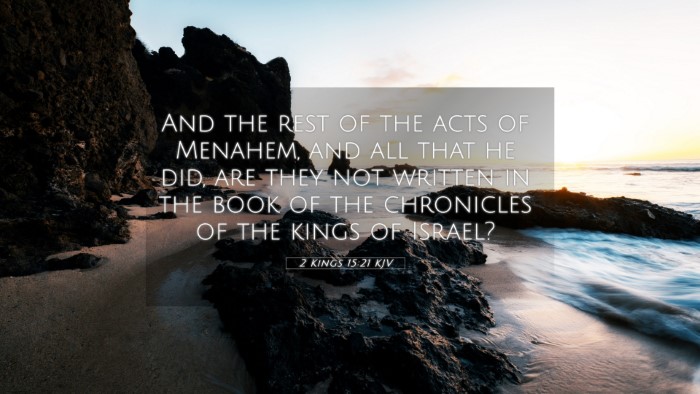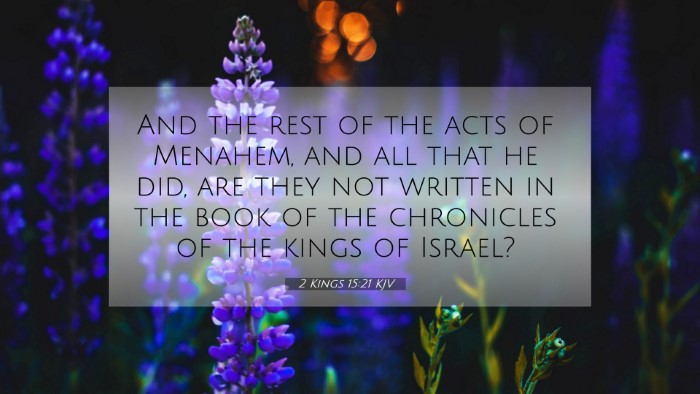Understanding 2 Kings 15:21
The verse 2 Kings 15:21 reads: "And the rest of the acts of Azariah, and all that he did, are they not written in the book of the Chronicles of the kings of Judah?"
This verse serves as a transitional commentary on the reign of King Azariah, also known as Uzziah, who ruled over Judah. It emphasizes the practice in Biblical narratives of directing readers to other records for a fuller account of a king's reign, suggesting that more comprehensive details are found in the historical records known as the "Chronicles."
Key Themes and Insights
-
Historical Documentation:
Both Matthew Henry and Albert Barnes note the importance of historical documentation in the Bible. They suggest that the references to other books indicate a depth of history that is not fully captured in the biblical text we have today.
-
Importance of Chronicles:
Adam Clarke highlights that the "book of the Chronicles" is a significant source for understanding the kings of Judah. This connects to the broader theme of how God's actions and the historical events concerning Israel and Judah were recorded for the benefit of future generations.
-
Divine Sovereignty:
Commentaries often discuss how the reigns of kings like Azariah fit into God’s divine plan. Even amidst political chaos, God’s purposes unfold in the history of Israel, and each king's life contributes to that overarching narrative.
-
Temporal vs. Eternal Records:
The verse alludes to the transitory nature of earthly achievements. While Azariah’s reign may be recorded in historical documents, the Bible contextualizes these efforts within eternity, pointing towards God's ultimate purposes beyond mere human records.
Bible Cross-References
To gain a deeper understanding of 2 Kings 15:21, consider these related passages:
- 2 Chronicles 26:1-23 - This chapter provides a detailed account of Azariah's reign and accomplishments.
- 1 Kings 15:1-7 - The passage discusses the lineage of the kings of Judah, highlighting their actions and the divine judgment that follows.
- 2 Kings 14:21 - Reflects on the context surrounding Azariah’s ascension and his father's, King Amaziah's, actions.
- 2 Chronicles 27:1-9 - Chronicles the behavior and reign of his son Jotham, which connects back to Azariah’s legacy.
- Micah 1:1 - This prophet's work underscores the historical timeframe of the kings, allowing readers to see the broader prophetic context.
- Isaiah 6:1 - In this passage, Isaiah’s vision during Uzziah’s reign highlights the period's significance and divine involvement.
- Luke 3:23-38 - The genealogy of Jesus connects back to the kings of Judah, illustrating the theological threads from the Old Testament to the New.
Connections Between Bible Verses
The exploration of the verse reveals several connections to other Biblical texts, offering insights into how individuals and events relate across the scriptures. Understanding these connections is vital for interpreting the overarching narrative of the Bible, especially concerning the actions of Israel's kings and God's covenant with His people.
Tools for Bible Cross-Referencing
For those seeking to deepen their understanding of the Bible's interconnectedness, consider various tools for Bible cross-referencing, such as:
- Bible concordances that list verses by keywords.
- Online Bible cross-reference guides which suggest related passages.
- Bible cross-reference systems within many study Bibles.
- Cross-reference study methods that engage thematic analysis.
- Bible reference resources that provide contextual backgrounds.
- Comprehensive Bible cross-reference materials available in print and digital formats.
Finding Bible Cross-References
For deeper exploration, you might ask how to find cross-references in the Bible. Here are useful methods:
- Look for keywords in a passage and track them across different verses.
- Utilize footnotes and margin notes in your Bible for immediate connections.
- Employ a Bible program or software that highlights connections.
Conclusion
In summary, 2 Kings 15:21 offers insight into the reign of King Azariah while inviting readers to explore the detailed accounts in the Chronicles. This exploration reminds us of the interconnected nature of Scripture—a complex tapestry of narratives that reflect God’s sovereignty and purpose over history. As we delve into these themes, we reveal the profound truths within the Scriptures.


